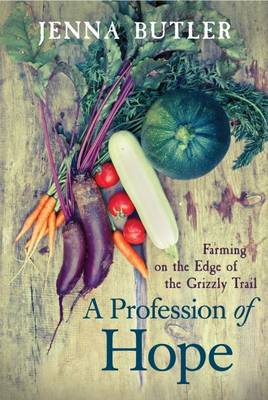Jenna Butler and her husband, Thomas, purchased 160 acres of northern bush in 2006. This book is the story of why and how. Butler goes through specific projects in the order in which they were attempted, each integral to the creation of the farm as it stands now. Woven throughout the entire book is an insistence that small farms must be the way of the future:
“The northern small farms … are places capable of producing a great deal of high-quality food in a manner that doesn’t take more from the land than the soil can bear. Small-scale organic farming methods offer ways of reclaiming marginal land whose goodness has been used up, putting into play farming methods that allow for a strengthening, rather than a wholesale destruction, of ecosystems. These are the spaces that protect and preserve the heirloom seeds passed down for generations and adapted specifically to the strictures of our local weather. At the same time, they’re more than just cold-zone seed vaults: Canadian small farms are places in which the rough beauty of the landscape can be seen thrumming just beneath the surface of daily life. For the many who live on them, they represent a tying together of ideology, economics and functionality. These farms provide fiscally viable returns to the natural world in a diversified way that is no longer possible on many large-scale operations. Small farms are celebrations of what it means to live closely and responsibly with the land through all seasons, no matter what the weather or the economy throws your way.”
As I have mentioned before, farm lit is a burgeoning genre but one that is fraught with complications. Young people moving out of big cities as “back-to-the-landers” are often met with snorts of derision. While their intentions are good these people often fail due to a lack of experience, knowledge, and comprehension of the environment. I do like that butler addresses this with one of the epigraphs, from Harold Fromm’s “From Transcendence to Obsolescence: A Route Map”: “I have no interest in a ‘return to Nature,’ which strikes me as an especially decadent form of aestheticism, like an adult of forty pretending to have the innocence of a child.” Instead, I agree with Butler’s philosophy that we each have our own places: urban or rural, it doesn’t matter. What matters is cultivating a respect for our land.
That being said, Butler describes her love for the northern bush in a way that made my spine tingle with recognition. Anyone with a love for the countryside will understand this, I think:
“This is what the small farm movement is all about. Inspiration. Diversity. Maybe a touch of madness: the desire to be out under the sky in all weather, to be working with our hands as much as possible, turning to big machinery only when necessary. When it comes down to it, it’s about hard work and long hours put in with the knowledge that in order to found our farm from nothing, it’s been necessary to hold other jobs in the wings, full-time jobs that also require energy. My husband and I are not extraordinary people. We’re everyday folk, and we’ve lived in a big city for most of our lives. But there’s a very specific love that drives us out here, that makes us want, more than anything, to be able to enrich our lives and those of others by working with this land, taking just what we need from a small corner while safeguarding the rest as a wild place for future generations. There’s an excitement about it all, not just about small-scale northern farming, but about what it can mean now, at this point in time, for this country. Paul Hawken, entrepreneur and environmental activist, frames it exactly: ‘When asked if I am pessimistic or optimistic about the future, my answer is always the same: if you look at the science about what is happening on earth and aren’t pessimistic, you don’t understand the data. But if you meet the people who are working to restore the earth and the lives of the poor, and you aren’t optimistic, you haven’t got a pulse.’”
Ultimately, this is a treatise on the multiple importances of small farms and why we need to prioritize them in Canadian, and by extension, North American, agricultural reform. Butler delivers these views through a compelling story about trying to eke out a farm from what amounts to a pile of infertile dirt and peat. But it is a beautiful pile of infertile dirt and peat—and I think we can all understand that kind of fierce, passionate love for place.
If you are interested in this kind of thing, there is also a really great bibliography of additional resources, including the philosophical (those similar to A Profession of Hope in style), as well as the more practical (the how-to guides of how to start a farm).
